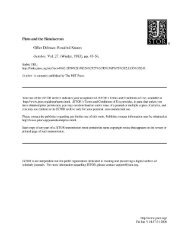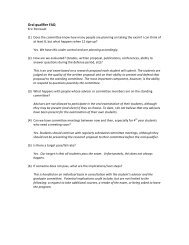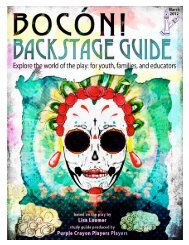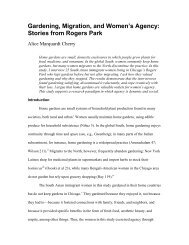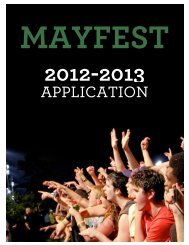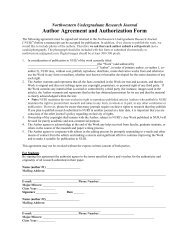research - Associated Student Government, Northwestern University
research - Associated Student Government, Northwestern University
research - Associated Student Government, Northwestern University
Create successful ePaper yourself
Turn your PDF publications into a flip-book with our unique Google optimized e-Paper software.
RESEARCHthe indigenous population to participate in elections,creating “democratic patterns of behavior and trust incompetition”, which enabled democratic success afterindependence. 8 Though both India and Singapore wereBritish colonies from 1858 to 1947 and 1819 to 1963,respectively, elite choice and public support rather thana British colonial legacy determined their democraticsuccess.The impact of elite choice and publicsupport on democratic successUnlike those who emphasize heterogeneity, wealth,and a British colonial legacy, I assert, like DankwartRustow, that decisions made by elites, particularly afterindependence, matter for democratic success. 9 In thecases of India and Singapore, namely those choices madeby their countries’ founding prime ministers, JawaharlalNehru (r. 1947-1964) and Lee Kuan Yew (r. 1959-1990),respectively, were primarily responsible for differences indemocratic success. In both of these countries, these mentransitioned their states to particular regimes in order toundercut certain sociopolitical or economic problemspresent after independence. Nehru, for instance, turnedto democracy as the solution to undermine ethnolinguisticand religious conflict, while Lee chose authoritarianismas a means undermine threats from communal andcommunist elements and jumpstart economic development.I argue that public support for the existing regimealso determines democratic success. For instance, ina democratic state such as India, public support reinforcedthe regime in times of great stress, enabling it toendure as had occurred during the elections of 1977.Two years earlier Nehru’s daughter, the late PrimeMinister Indira Gandhi (r. 1966-1977; 1980-1984),imposed authoritarianism in India in response to supposedpolitical chaos. In the 1977 elections, the Indianelectorate dissatisfied with authoritarian policies andever committed to democratic rule voted her and theCongress Party out of office. In contrast to democraticIndia, the middle class’s support for authoritarianism inSingapore helped to further entrench the regime therebypreventing democratization. Indeed, Singapore’s middleclass have not showed any interest in democracy as theycontinue to benefit from their authoritarian leaders’economic policies.MethodologyIn my original thesis, I used a combination ofprimary and secondary sources, many of which werereused for this paper, describing the impact of Nehru andLee’s decision to pursue a democratic or authoritarianregime after their respective independence and thereasons these regimes persist. I incorporated Nehru andLee’s published essays and interviews, speeches, andmemoirs, and census and other statistical data to betterVOLUME 7, 2011-2012understand the reasons behind their decision to establisheither democratic or authoritarian rule. Furthermore,I used constitutions, polling data, and articles fromnational and international publications to learn ofthe outcomes and public reactions to their policies.In addition, I depended on biographies to learn moreabout the personalities of these leaders and consultedhistories of India and Singapore to learn about theimportant political trends that had occurred since Indianand Singaporean independence. I supplemented all ofthese sources with articles and books that concerneddemocratic theories, British colonialism, and postindependenceregimes in former British colonies.It is important to note that I limited my discussionon elite choice to those decisions made under Nehru andLee instead of other elites in India and Singapore. Mostof the histories and other source material described theiroverwhelming influence on determining the regimes intheir respective states. Indeed, many others influenced thepolitical outcomes for both of these states, but little comparedto Nehru and Lee. Even after Nehru’s death andLee’s retirement in the 1990s, their respective ideals andinstitutions continued to impact politics in their respectivestates.IndiaAfter India received its independence from GreatBritain, Nehru labored tirelessly to establish democraticrule in order to undermine a number of serious problemsfacing his state. One of these problems came in theform of Hindu, Muslim, and Sikh communalism, whichhad resulted in an extremely violent and emotionallydevastating Partition around the time of independence.Fearing that lingering tensions among these communitieswould fragment the Indian state even further, Nehrucalled on his compatriots to forgo “narrow-mindedness”,which oft fueled communalism. 10 Though he remainedcommitted to diffusing tensions among India’s religiouscommunities, incidents such as Hindu nationalist NathuramGodse’s assassination of his friend MahatmaGandhi and the formation of a Sikh separatist movementin north India confirmed that hostilities remained. 11In addition to communal tensions, numerousethnolinguistic groups pressured Nehru to create forthem semi-autonomous polities or ‘states’. Given thefragile sociopolitical climate after independence, he hesitatedsince he felt that the formation of such states mightresult in greater fragmentation in India: “The countryhad just been divided on the basis of religion; would notdividing it further on the basis of language merely encouragethe break-up of the Indian Union”. 12 Though hesucceeded in persuading certain political leaders of thelogic behind his decision, ethnolinguistic communitiessuch as the Kannada, Marathi, and Telegu continued topush for them.Owing to the threat of fragmentation from the reli-NORTHWESTERN UNDERGRADUATE RESEARCH JOURNAL9




